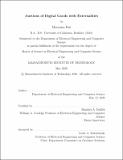Auctions of digital goods with externalities
Author(s)
Rui, Maryann(Maryann Z.)
Download1192487088-MIT.pdf (671.8Kb)
Other Contributors
Massachusetts Institute of Technology. Department of Electrical Engineering and Computer Science.
Advisor
Munther A. Dahleh.
Terms of use
Metadata
Show full item recordAbstract
Data is increasingly important for firms, regulators, and researchers to develop accurate models for decision-making. Since data sets often need to be externally acquired, a systematic way to value and trade data is necessary. Moreover, buyers of data often interact with each other downstream, such as firms competing in a market. In this setting, an allocation of data may not only benefit the buying firm, but also impose negative externalities on the firm's competitors. The way data is allocated and sold should thus depend on the particulars of its downstream usage and the interaction between data buyers. We capture the problem of valuing and selling data sets to buyers who interact downstream within the general framework of auctions of digital, or freely replicable, goods. We study the resulting single-item and multi-item mechanism design problems in the presence of additively separable, negative allocative externalities among bidders. Two settings of bidders' private types are considered, in which bidders either know the externalities that others exert on them or know the externalities that they exert on others. We obtain forms of the welfare-maximizing (efficient) and revenue-maximizing (optimal) auctions of single digital goods in both settings and highlight how the information structure affects the resulting mechanisms. We find that in all cases, the resulting allocation rules are deterministic single thresholding functions for each bidder. For auctions of multiple digital goods, we assume that bidders have independent, additive valuations over items and study the first setting of privately known incoming externalities. We show that the welfare-maximizing mechanism decomposes into multiple efficient single-item auctions using the Vickrey-Clarke-Groves mechanism. Under revenue-maximization, we show that selling items separately via optimal single-item auctions yields a guaranteed fraction of the optimal multi-item auction revenue. This allows us to construct approximately revenue-maximizing multi-item mechanisms using the aforementioned optimal single-item mechanisms.
Description
Thesis: S.M., Massachusetts Institute of Technology, Department of Electrical Engineering and Computer Science, May, 2020 Cataloged from the official PDF of thesis. Includes bibliographical references (pages 83-86).
Date issued
2020Department
Massachusetts Institute of Technology. Department of Electrical Engineering and Computer SciencePublisher
Massachusetts Institute of Technology
Keywords
Electrical Engineering and Computer Science.